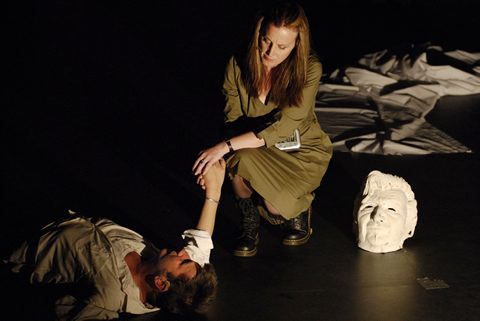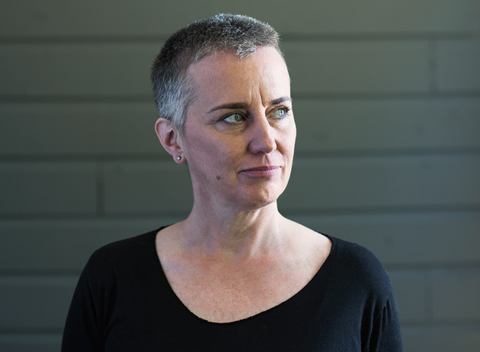In Nadia Ross’s most recent theatrical production, What Happened to the Seeker, members of the audience view an exhibition of objects, two videos and some live performance. If they get bored with the first part, they can always have a drink on stage. It’s part of her contract with the theatres where she and her company perform – that bar on stage. “It’s an important part of the show,” she says, noting that it helps break down the wall between stage and audience.
For more than 20 years, Ross (BA 1986 Victoria) has been experimenting with new forms of theatre and last October all the risks paid off when she won the 2016 Siminovitch Prize for excellence in theatrical innovation. Canada’s richest theatre prize, it’s worth $100,000 including $25,000 for one or more younger artists named by the winner. (Ross chose the creator-performers, Sarah Conn and Shaista Latif.)
For all her avant-garde credentials, Ross retains a keen interest in narrative. There’s always a clear story in her work and it’s always intended to be entertaining. “That’s important to me,” she says. At the same time, what really interests her is finding new ways to tell stories – a non-actor on stage in one production, videotaped puppets in another.
“I try to get away from the pre-written text because I want things to be super-live on stage,” she says. “I want it to feel like it’s just happening right now. … So I try to create structures that will allow that to happen on stage.”
Ross’s unconventional approach was inspired in part by her time at U of T, where she studied drama at University College. Prof. Pia Kleber, who ran the department from 1987 to 2007, was expanding its focus outward. International directors came to Toronto, students were sent to study and perform abroad – in Paris, Berlin, Milan and even Shanghai – with salubrious results. In addition to technicians and designers (many now employed at Stratford and Shaw), the program has produced at least two highly successful directors. Ross is the second graduate of the U of T drama program to win the Siminovitch Prize, after Daniel Brooks (BA 1981 UC) in 2001. Playwright John Mighton (BA 1978 Victoria, MSc 1994, PhD 2000), who did his doctorate in mathematics, took the prize in 2005.
Ross’s own time abroad was life-changing. In Berlin, where she apprenticed with Bertolt Brecht’s old company, the Berliner Ensemble, she saw a very different approach to theatre – “a very relaxed, authentic way of being on stage that I had not seen in Canada” – and a thoroughly irreverent approach to written texts. In East Berlin, she says, “they were tearing texts apart.” She “came back with a completely different outlook on the medium and what it was about.”

Back in Toronto in the 1990s, she worked with such stars of the independent theatre scene as director Daniel Brooks, actress Tracy Wright, and writer-director Diane Cave with whom she created the Chalmers Award-winning The Alastair Trilogy. In 1992, she founded her own company, STO Union, and went on to produce shows such as 7 Important Things (with George Acheson) and, most recently, What Happened to the Seeker. The story of a woman’s frustrated search for meaning, Seeker offers the audience a “cafeteria” of options – an art exhibition, a taped conversation and two videos. Performers guide the audience through some of the more troubling aspects of the play (including the fact that it doesn’t feel like a traditional play), but only at the very end of the production is there any staged performance. The effect, says Ross, is to make the staged section “that much more powerful. … The ‘live’ performance is the Seeker’s answer to her search.”
The seeming brokenness of Ross’s shows, or what she refers to as their “punk or do-it-yourself quality,” is there for a reason. Not only does it mirror the turbulent times in which we live, it helps to engage the audience. “We no longer sit in the dark theatre and behave properly in front of the wall of the well-made play,” she says.
“Audiences, in my shows, are kept on their toes, and in exchange, they are allowed to bring all of themselves into the room.”
Recent Posts
U of T’s 197th Birthday Quiz
Test your knowledge of all things U of T in honour of the university’s 197th anniversary on March 15!
Are Cold Plunges Good for You?
Research suggests they are, in three ways
Work Has Changed. So Have the Qualities of Good Leadership
Rapid shifts in everything from technology to employee expectations are pressuring leaders to constantly adapt






